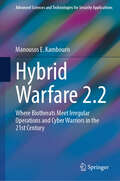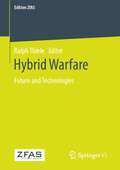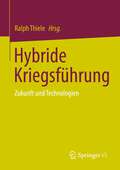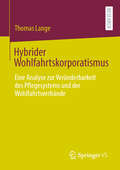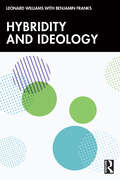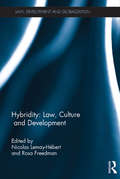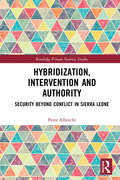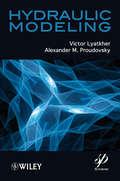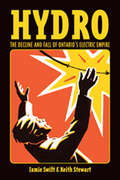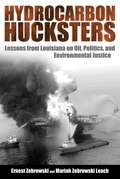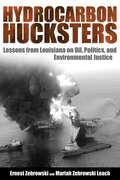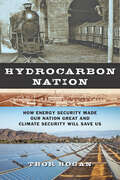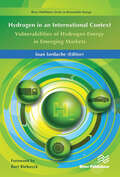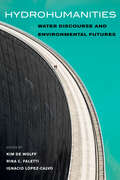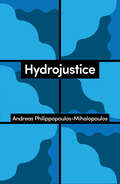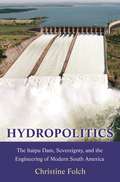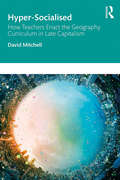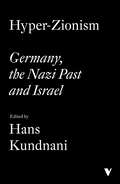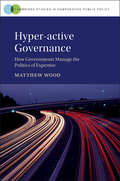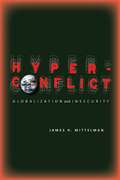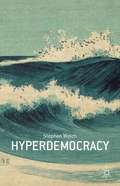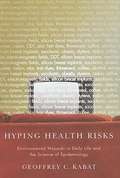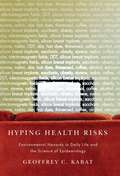- Table View
- List View
Hybrid War: Attack on the West
by Mauro VoerzioDisinformation is a bad virus for Democracies and a vaccine can never be discovered to render it harmless. With the help of everyone, however, we can contain it and make it less effective. The book talks about the techniques used by disinformers, the terminologies that are used every day by journalists and insiders whose meaning is often unknown, disinformation in history, the psychological aspects of disinformation, case studies, objectives that disinformation sets for itself. Disinformation is certainly one of the most important components of the new hybrid wars. A hybrid war is underway against the fundamental values of the West, a hybrid war that aims to collapse the project of the European Union, the largest peace project in history. Recognizing disinformation and disinformers will help us recognize our enemies, those who want to destroy the society we built, with not a few sacrifices, by our grandparents and our parents. As in all wars, in hybrid war, there are generals and soldiers. It is up to us to decide which side of the fence to stand on in this modern call to arms.
Hybrid Warfare 2.2: Where Biothreats Meet Irregular Operations and Cyber Warriors in the 21st Century (Advanced Sciences and Technologies for Security Applications)
by Manousos E. KambourisThe concept of Hybrid Warfare has gained prominence in recent decades. It is a novel terminology, but the concept is detectable since antiquity: Ancient Chinese, Ancient Greeks and the Jews of Exodus were all well familiar, so well to have let us know. Similarly, bioagents have been used malevolently since always. What is novel is that these two, in the present context, are not only interfacing smoothly, but in an enhanced context: The Hybrid Warfare, which has now enriched its portfolio, from actions of provocation, insurgency, economic warfare, special operations, proxy warfare and social destabilization to the Residual domain, the cyberspace, while the conventional, 3D space expands. Now the Space and the Deep are included in the topography of the friction zone. In this, the bio- factor becomes not only relevant but also an amplifier: using the technology malevolently, all the advances made to combat disease may be used to cause, further, or perplex and complicate disease. Improved or totally novel or even alien germs may replace explosives in bombs, shells or suicidal /kamimaze drones and taint bullets and fragments. Microrobots may deliver cancer cells to targeted individuals to foster cancer, or specific supergerms for an infection to rage unchallenged. And what happens if the mechanism of these cancers and infections is intentionally provided with an Abort signal? Global extortions would become probable, not just possible. Far from Science Fiction, this dystopia becomes more probable by the day. The Artificial Intelligence simply makes it easier to occur. Technology allows manipulation and intervention in levels and extends only imagined in the Past, but the application of these capabilities is clearly of dual use, with the destructive potential leveraged by the complexity of the social and state structure. Within this book, we explore the “How” (occasionally the “What” also) in some of these instances. From cyber terrorists to aggressive bioindustrialists and “democratized” ballistic and cruise missile technology, it could be coined as "The Book of Modern Mayhem”.
Hybrid Warfare: Future and Technologies (Edition ZfAS)
by Ralph ThieleHybrid warfare is becoming a long-term strategic challenge for NATO and the EU. This book examines its conceptual foundations, actors and technologies from a holistic, systemic perspective. In particular, new, disruptive technologies have a catalytic effect on hybrid methods and tools. 19 Technologies prove to be particularly relevant. They improve the initial conditions for hybrid action, expand the arsenal of hybrid actors and improve the scope and prospects for success of their activities.
Hybride Kriegsführung: Zukunft und Technologien
by Ralph ThieleDie hybride Kriegsführung entwickelt sich zu einer langfristigen strategischen Herausforderung für die NATO und die EU. In diesem Buch werden ihre konzeptionellen Grundlagen, Akteure und Technologien aus einer ganzheitlichen, systemischen Perspektive untersucht. Insbesondere die neuen, disruptiven Technologien haben eine katalytische Wirkung auf die hybriden Methoden und Instrumente. 19 Technologien erweisen sich als besonders relevant. Sie verbessern die Ausgangsbedingungen für hybrides Handeln, erweitern das Arsenal hybrider Akteure und verbessern die Reichweite und Erfolgsaussichten ihrer Aktivitäten.
Hybrider Wohlfahrtskorporatismus: Eine Analyse zur Veränderbarkeit des Pflegesystems und der Wohlfahrtsverbände
by Thomas LangeDie vorliegende Studie untersucht die Beständigkeit alter Strukturen im Pflegesektor und nimmt dabei die Rolle der Wohlfahrtsverbände in den Blick. Alte Kooperationsstrukturen zwischen Staat und Freier Wohlfahrtspflege haben umfassende Reformen in den 90er Jahren überdauert und dominieren trotz der Ökonomisierungstendenzen immer noch die Steuerung des Pflegesektors. Gleichzeitig stehen Staat und Wohlfahrtsverbände in einem neuartigen, konfrontativen Verhältnis zueinander. Es zeigt sich, dass Aufbau und Steuerung des Pflegesektors und der Wohlfahrtsverbände von Spannungen gekennzeichnet sind, die sich zunächst nicht auflösen lassen. Es wird ein Hybriditätskonzept entwickelt, das dieses spannungsgeladene institutionelle Design in diesem Wohlfahrtsarrangement ausleuchtet. Hybride, d.h. institutionelle Mischformen entstehen, indem reformgetriebener Pfadwechsel von nicht absehbarer Pfadabhängigkeit begleitet wird, so der Kern des Ansatzes.
Hybridity and Ideology
by Benjamin Franks Leonard WilliamsHybridity and Ideology analyzes the structure, development, and significance of political perspectives that mix or fuse the distinct beliefs, practices, and identities found in other ideologies—for example, hybrid worldviews such as liberal nationalism, ecosocialism, and anarchafeminism.Employing concepts and methods drawn from ideology studies, discourse theory, and cultural studies, Leonard Williams and Benjamin Franks explore the meaning of hybridity, the processes by which ideologies hybridize, and the political implications of the blended ideologies that result. Their hybrid inquiry fashions a theoretical vocabulary and framework for understanding and studying ideological hybridization.Using examples from a broad spectrum of ideologies, the book discusses the characteristic patterns by which hybrids are constructed from parent ideologies. It explores the operations and processes that enable hybrids to emerge from other ideologies and develop within social and political contexts. Lastly, it addresses how ideologies provide resources for political action and discusses the criteria for judging the success of hybrid ideologies.Hybridity and Ideology offers insight into the dynamic processes of hybridization central to ideological transformation and political change. It provides a helpful resource for students and researchers in political theory, cultural studies, and philosophy.
Hybridity: Law Culture And Development (Law, Development and Globalization)
by Rosa Freedman Nicolas Lemay-HebertThis book explores recent developments in the concept of hybridity through a multi-disciplinary perspective, bringing ideas about legal plurality together with the fields of peace, development and cultural studies. Analysing the concepts of hybridity and hybridization, their history, their application in law and legal studies, and their implications for thinking and rethinking legal plurality, the book shows how the concept of hybridity can contribute to an understanding of the processes that occur when different normative or legal orders or frameworks confront each other.
Hybridization, Intervention and Authority: Security Beyond Conflict in Sierra Leone (Routledge Private Security Studies)
by Peter AlbrechtThis book explains how security is organized from the local to the national level in post-war Sierra Leone, and how external actors attempted to shape the field through security sector reform. Security sector reform became an important and deeply political instrument to establish peace in Sierra Leone as war drew to an end in the late 1990s and early 2000s. Through historical and ethnographic perspectives, the book explores how practices of security sector reform have both shaped and been shaped by practices and discourses of security provision from the national to the local level in post-war Sierra Leone. It critiques how the notion of hybridity has been applied in peace and security studies and cultural studies, and thereby provides an innovative perspective on IR, and the study of interventions. The book is the first to take the debate on security in Sierra Leone beyond a focus on conflict and peacebuilding, to explore everyday policing and order-making in rural areas of the country. Based on fieldwork between 2005 and 2018, it includes 200+ interviews with key players in Sierra Leone from the National Security Coordinator and Inspector-General of Police in Freetown to traditional leaders and miners in Peyima, a small town on the border with Guinea. This book will be of much interest to students of critical security, anthropology, African politics and IR in general.
Hyderabad, British India, and the World
by Eric Lewis BeverleyThis examination of the formally autonomous state of Hyderabad in a global comparative framework challenges the idea of the dominant British Raj as the sole sovereign power in the late colonial period. Beverley argues that Hyderabad's position as a subordinate yet sovereign 'minor state' was not just a legal formality, but that in exercising the right to internal self-government and acting as a conduit for the regeneration of transnational Muslim intellectual and political networks, Hyderabad was indicative of the fragmentation of sovereignty between multiple political entities amidst Empires. By exploring connections with the Muslim world beyond South Asia, law and policy administration along frontiers with the colonial state and urban planning in expanding Hyderabad City, Beverley presents Hyderabad as a locus for experimentation in global and regional forms of political modernity. This book recasts the political geography of late imperialism and historicises Muslim political modernity in South Asia and beyond.
Hydraulic Modeling
by Victor M. Lyatkher Alexander M. ProudovskyWater. Except for air, it is the most important ingredient to all life on Earth. It surrounds us every day. We are literally bathed in it, we cook our food with it, and we need a steady stream of it in our bodies every single day just to survive. But water, and the study of it, is one of the most important and unheralded branches of engineering, affecting every other aspect of engineering in almost every industry. We harness its power for energy, we inject massive blasts of it into the earth to extract oil, gas, and minerals, and we use it in nearly every single industrial application, including food processing, refining, manufacturing, and waste disposal, just to name a few. Hyraulic modeling is, essentially, the understanding and prediction of fluid flow and its applications in industrial, municipal, and environmental settings, whether in a creekbed, locked in the pores of rocks deep in the earth, or in the ocean. Mathematical models, which started out with mechanical pencils and drafting tables originally, have been increasingly relied upon over the last few decades, due to the invention, growth, and refinement of computers. Physical modeling, however, is still practiced in laboratories, and it is the intersection of physical and mathematical modeling of fluid flow that is most successful in creating models that are safer, less costly, and are better for the environment. Hydraulic Modeling introduces and explores this incredibly important science, from the most basic tenets to valuable real-world applications that are used in industry today. It is the only volume on the market to offer a thorough coverage of the subject without adding lots of useless fluff or inapplicable appendices. It is a must-have for any engineer, scientist, or student working with hydraulic modeling, as a daily reference or a textbook.
Hydro: The Decline and Fall of Ontario's Electric Empire
by Jamie Swift Keith Stewart“Nothing is going to go wrong.” -Mike Harris, 2001 Privatization of power soon became one of the biggest political disasters in Ontario history. Hydro reveals a train wreck that was decades in the making. First there was blind faith in the nuclear option, steeped in ecological arrogance. Then came the promise of marketplace magic. Jamie Swift and Keith Stewart tell the tale of how it unfolded. It’s a dramatic story of the greed, intrigue, and resistance that led to the dismantling of Canada’s largest crown corporation. A crucial part of the story is how Ontario ignored thirty years of green arguments for conservation and renewable energy. Based on interviews with former premiers, Hydro insiders, and grassroots activists, Hydro will intrigue anyone wondering how to keep the lights on without frying the planet.
Hydrocarbon Hucksters: Lessons From Louisiana on Oil, Politics, and Environmental Justice
by Ernest Zebrowski Mariah Zebrowski LeachHydrocarbon Hucksters is the saga of the oil industry's takeover of Louisiana--its leaders, its laws, its environment, and, by rechanneling the flow of public information, its voters. It is a chronicle of mindboggling scientific and technical triumphs sharing the same public stew with myths about the "goodness" of oil and bald-faced public lies by politicians and the captains of industry. It is a story of money and power, greed and corruption, jingoism and exploitation, pollution and disease, and the bewilderment and resignation of too many of the powerless. Most importantly, Hydrocarbon Hucksters is a case study of what happens when a state uncritically hands the oil and petrochemical industries everything they desire. Today, Louisiana ranks at or near the bottom of the fifty states on virtually every measure related to the quality of life--income, health, education, environment, public services, public safety, physical infrastructure, and vulnerability to disasters (both natural and man-made). Nor, contrary to the claims of the hydrocarbon sector, has there been much in the way of job creation to offset all of this social grief. The authors (one a scientist, the other an environmental lawyer) have woven together the science, legal history, economic issues, and national and global contexts of what has happened. Their objective is to raise enough national awareness to prevent other parts of the United States from repeating Louisiana's historical follies. The authors are uncle and niece, a generation apart, who have melded their conclusions from two separate tracks.
Hydrocarbon Hucksters: Lessons from Louisiana on Oil, Politics, and Environmental Justice
by Ernest Zebrowski Mariah Zebrowski LeachHydrocarbon Hucksters is the saga of the oil industry's takeover of Louisiana—its leaders, its laws, its environment, and, by rechanneling the flow of public information, its voters. It is a chronicle of mindboggling scientific and technical triumphs sharing the same public stew with myths about the “goodness” of oil and bald-faced public lies by politicians and the captains of industry. It is a story of money and power, greed and corruption, jingoism and exploitation, pollution and disease, and the bewilderment and resignation of too many of the powerless. Most importantly, Hydrocarbon Hucksters is a case study of what happens when a state uncritically hands the oil and petrochemical industries everything they desire. Today, Louisiana ranks at or near the bottom of the fifty states on virtually every measure related to the quality of life—income, health, education, environment, public services, public safety, physical infrastructure, and vulnerability to disasters (both natural and man-made). Nor, contrary to the claims of the hydrocarbon sector, has there been much in the way of job creation to offset all of this social grief. The authors (one a scientist, the other an environmental lawyer) have woven together the science, legal history, economic issues, and national and global contexts of what has happened. Their objective is to raise enough national awareness to prevent other parts of the United States from repeating Louisiana's historical follies. The authors are uncle and niece, a generation apart, who have melded their conclusions from two separate tracks.
Hydrocarbon Nation: How Energy Security Made Our Nation Great and Climate Security Will Save Us (The Johns Hopkins University Studies in Historical and Political Science #133)
by Thor HoganUnderstanding the complex history of US fossil fuel use can help us build a sustainable future.In Hydrocarbon Nation, Thor Hogan looks at how four technological revolutions—industrial, agricultural, transportation, and electrification—drew upon the enormous hydrocarbon wealth of the United States, transforming the young country into a nation with unparalleled economic and military potential. Each of these advances engendered new government policies aimed at strengthening national and economic security. The result was unprecedented energy security and the creation of a nation nearly impervious to outside threats. However, when this position weakened in the decades after the peaking of domestic conventional oil supplies in 1970, the American political and economic systems were severely debilitated. At the same time, climate change was becoming a major concern. Fossil fuels created the modern world, yet burning them created a climate crisis. Hogan argues that everyday Americans and policymakers alike must embrace the complexity of this contradiction in order to help society chart a path forward. Doing so, Hogan explains, will allow us to launch a critically important sustainability revolution capable of providing energy and climate security in the future. Hydrocarbon Nation provides reasons to believe that we can succeed in expanding on the benefits of the Hydrocarbon Age in order to build a sustainable future.
Hydrogen in an International Context: Vulnerabilities of Hydrogen Energy in Emerging Markets
by Ioan IordacheHydrogen in an International Context: Vulnerabilities of Hydrogen Energy in Emerging Markets describes strategies and developments for hydrogen civilization efforts realised by various stakeholders such as authorities, institutes, research, industry, and individuals, in different countries and at different stages of the development cycle. Through their contributions, the chapter authors in this book propose a new approach to actual and relevant topics of interest, generically called the hydrogen economy and civilization.Hydrogen vulnerabilities is a topic that includes new challenges that face the hydrogen energy market. Weaknesses for the hydrogen stakeholder are becoming more refined, and it is necessary to be an active and sensitive player to understand these. A prosperous development of hydrogen will require the assimilation of numerous, diverse and unfamiliar contexts. Challenges for hydrogen will not only be in scientific, technical, economical or public acceptance, but challenges also lie in the genesis of this topic and the neglect of some aspects, however marginal, which negatively influence the desired hydrogen developed.This book informs the reader about the status of hydrogen energy in the international market, and it includes a series of examples and case studies about hydrogen activities in various countries. Thus, due to the synergy of this library of contexts, the reader should be able to reach a level of intuition enabling them to see the strengths and weaknesses of hydrogen.
Hydrohumanities: Water Discourse and Environmental Futures
by Kim De Wolff, Rina C. Faletti and Ignacio López-CalvoA free open access ebook is available upon publication. Learn more at www.luminosoa.org. Discourse about water and power in the modern era have largely focused on human power over water: who gets to own and control a limited resource that has incredible economic potential. As a result, discussion of water, even in the humanities, has traditionally focused on fresh water for human use. Today, climate extremes from drought to flooding are forcing humanities scholars to reimagine water discourse. This volume exemplifies how interdisciplinary cultural approaches can transform water conversations. The manuscript is organized into three emergent themes in water studies: agency of water, fluid identities, and cultural currencies. The first section deals with the properties of water and the ways in which water challenges human plans for control. The second section explores how water (or lack of it) shapes human collective and individual identities. The third engages notions of value and circulation to think about how water has been managed and employed for local, national, and international gains. Contributions come from preeminent as well as emerging voices across humanities fields including history, art history, philosophy, and science and technology studies. Part of a bigger goal for shaping the environmental humanities, the book broadens the concept of water to include not just water in oceans and rivers but also in pipes, ice floes, marshes, bottles, dams, and more. Each piece shows how humanities scholarship has world-changing potential to achieve more just water futures.
Hydrojustice (Theory Redux)
by Andreas Philippopoulos-MihalopoulosThis is a book about justice, but not as we know it. Andreas Philippopoulos-Mihalopoulos argues that justice is always hydrojustice – that is, always defined in relation to water, the element that constitutes and unites all bodies, human and nonhuman. Hence justice is not an ideal state reached through merely human procedures (legal, political, economic, etc.) but also a planetary one, always conjoined with the element of water that both constitutes and transcends the boundaries of the human. In short, hydrojustice is the just confluence of all bodies, human and nonhuman.For the first time, this book brings questions of justice into line with the current literature on water. Up to now, justice has been understood as an anthropocentric affair, with most existing theories accepting and reinforcing the division between human and nonhuman. This book builds on feminism, ecology, posthumanism and the current Blue Turn in the humanities and social sciences, and puts questions of justice at their core.What the book proposes, however, is not simply an ecological concept of justice. Rather, through examples taken from current affairs, science and the art world, it attempts a radical recalibration of what justice is. The book argues that hydrojustice is already here, part of our planetary condition, but it requires unearthing, in the double sense of revealing what is hidden and allowing earth to cede priority to the aquatic.
Hydropolitics: The Itaipu Dam, Sovereignty, and the Engineering of Modern South America (Princeton Studies in Culture and Technology #20)
by Professor Christine FolchAn in-depth look at the people and institutions connected with the Itaipu Dam, the world’s biggest producer of renewable energyHydropolitics is a groundbreaking investigation of the world’s largest power plant and the ways the energy we use shapes politics and economics. Itaipu Binational Hydroelectric Dam straddles the Paraná River border that divides the two countries that equally co-own the dam, Brazil and Paraguay. It generates the carbon-free electricity that powers industry in both the giant of South America and one of the smallest economies of the region. Based on unprecedented access to energy decision makers, Christine Folch reveals how Paraguayans harness the dam to engineer wealth, power, and sovereignty, demonstrating how energy capture influences social structures.During the dam’s construction under the right-wing military government of Alfredo Stroessner and later during the leftist presidency of liberation theologian Fernando Lugo, the dam became central to debates about development, governance, and prosperity. Dams not only change landscapes; Folch asserts that the properties of water, transmuted by dams, change states. She argues that the dam converts water into electricity and money to produce hydropolitics through its physical infrastructure, the financial liquidity of energy monies, and the international legal agreements managing transboundary water resources between Brazil and Paraguay, and their neighbors Argentina, Bolivia, and Uruguay.Looking at the fraught political discussions about the future of the world’s single largest producer of renewable energy, Hydropolitics explores how this massive public works project touches the lives of all who are linked to it.
Hyper-Socialised: How Teachers Enact the Geography Curriculum in Late Capitalism
by David MitchellHyper-socialised explores the challenges of late capitalist times for education systems, schools and teachers. It looks at how trends of accountability, ‘teaching to the test’, using pupil voice and reliance on network technologies are all connected to powerful social and economic forces, shaping the curriculum as it is taught in classrooms. Such forces threaten to overwhelm teachers but, in the right hands, they can also be harnessed to create, influence and teach a truly powerful curriculum for their students. Presenting a historical view of curriculum change, the book examines how society, curriculum and teachers are linked. Using geography as an illustrative subject, the chapters investigate what influences teachers, to what extent they are in control of the curriculum, and what else is shaping it. Divided into two parts, it offers An in-depth exploration of the relationship between society, teachers and the curriculum, including that what and how to teach remain wide open to debate Evidence-based research into the significance and implications of ‘hyper-socialised’ curriculum enactment for teachers and teacher education Four case study ‘portraits’ of geography departments and personal curriculum stories of each Head of Department Insights into the nature of teaching as a profession and how a crisis of teacher recruitment and retention may be addressed. Written in clear and accessible terms, this book is an essential resource for teacher educators, subject teachers, headteachers and educational researchers who want to understand how and why schools and teaching are changing – and what this means for them.
Hyper-Zionism: Germany, the Nazi Past and Israel
by Hans KundnaniThe most thorough and damning account of German Zionism available from leading authors, academics and activists.Germany remains unmatched across Europe in its unconditional support for the Israeli state. Since October 7, 2023, the German state has particularly distinguished itself in its brutal repression of anyone who dares to speak out against Israel's crimes in Palestine. What is going on?In this urgent collection, leading authors including Hans Kundnani, Nahed Samour, Adam Tooze, and Dirk Moses, explore Germany's pathological commitment to the state of Israel. The book investigates the many levels at which Germany's "hyper-Zionism" operates, with essays on the country's memory culture – Erinnerungskultur – around the Holocaust and its effect on Arab and Muslim Germans, the state's protection of Israel as a foundational staatsräson, and the self-destruction of German cultural institutions in the name of defending Israel. The collection also probes the twin phenomena of philo- and antisemitism that permeate contemporary German institutions.The situation in Germany reverberates across Europe and beyond. Hyper-Zionism shows how history, politics and bad faith conspire to create a stifling culture of suppression, silencing and violence.
Hyper-active Governance: How Governments Manage the Politics of Expertise (Cambridge Studies in Comparative Public Policy)
by Matthew WoodHyper-active governance is a new way of thinking about governing that puts debates over expertise at the heart. Contemporary governing requires delegation to experts, but also increases demands for political accountability. In this context, politicians and experts work together under political stress to adopt different governing relationships that appear more 'hands-off' or 'hands-on'. These approaches often serve to displace profound social and economic crises. Only a genuinely collaborative approach to governing, with an inclusive approach to expertise, can create democratically legitimate and effective governance in our accelerating world. Using detailed case studies and global datasets in various policy areas including medicines, flooding, water resources, central banking and electoral administration, the book develops a new typology of modes of governing. Drawing from innovative social theory, it breathes new life into debates about expert forms of governance and how to achieve real paradigm shifts in how we govern our increasingly hyper-active world.
Hyperconflict: Globalization and Insecurity
by James H. MittelmanMittelman (international affairs, American U. ) investigates how globalization is connected to security or insecurity, and the implications of that connection for world order. Introducing the novel concept of hyperconflict, he argues that a novel pattern is forming as insecurity is being globalized, political violence reorganized, pervasive uncertainty marked by a rising climate of fear, and structures of armed and other conflict moving beyond the hands of governments and their agents. After reviewing coercive globalization, he looks in turn at conflicts involving the Multilateral Agreement on Investment, Asia, Seattle, and 9/11. Then he considers post-national security. Stanford Security Studies is an imprint of Stanford University Press. Annotation ©2010 Book News, Inc. , Portland, OR (booknews. com)
Hyperdemocracy
by Stephen WelchThis book argues that a well-educated citizenry and freer flow of information has contributed to a state of "hyperdemocracy" which impedes itself. This book applies the idea of 'reflexive modernization' to democratic theory, setting out a new perspective on the challenges democracy faces.
Hyping Health Risks: Environmental Hazards in Daily Life and the Science of Epidemiology
by Geoffrey C. KabatAccording to author and epidemiologist Geoffrey C. Kabat, this hyping of low-level environmental hazards leads to needless anxiety and confusion on the part of the public as to which exposures have important effects on health.
Hyping Health Risks: Environmental Hazards in Daily Life and the Science of Epidemiology
by Geoffrey KabatThe media constantly bombard us with news of health hazards lurking in our everyday lives, but many of these hazards turn out to have been greatly overblown. According to author and epidemiologist Geoffrey C. Kabat, this hyping of low-level environmental hazards leads to needless anxiety and confusion on the part of the public concerning which exposures have important effects on health and which are likely to have minimal or no effect. Kabat approaches health scares as "social facts" and shows that a variety of factors can contribute to the inflating of a hazard. These include skewed reporting by the media, but also, surprisingly, the actions of researchers who may emphasize certain findings while ignoring others; regulatory and health agencies eager to show their responsiveness to the health concerns of the public; and politicians and advocates with a stake in a particular outcome. By means of four case studies, Kabat demonstrates how a powerful confluence of interests can lead to overstating or distorting the scientific evidence. He considers the health risks of pollutants such as DDT as a cause of breast cancer, electromagnetic fields from power lines, radon within residences, and secondhand tobacco smoke. Tracing the trajectory of each of these hazards from its initial emergence to the present, Kabat shows how publication of more rigorous studies and critical assessments ultimately help put hazards in perspective.

